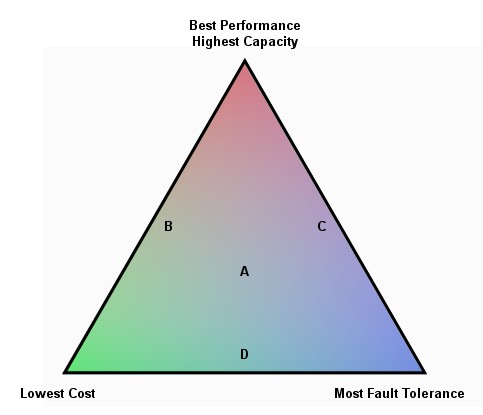[ The PC Guide | Systems and Components Reference Guide | Hard Disk Drives | Hard Disk Performance, Quality and Reliability | Redundant Arrays of Inexpensive Disks (RAID) | Why Use RAID? Benefits and Costs, Tradeoffs and Limitations ]
RAID Tradeoffs
"Fast, cheap, good: choose two"
The phrase above is a famous one in the world of computing, and elsewhere: it's a good rule of thumb to keep in mind when making many purchase decisions. It describes well what I call the "essential tradeoff triangle" that applies to thousands of different technologies and devices, from PCs to race car engines to kitchen blenders: you can easily get something that is inexpensive and fast, but at the cost of quality; or something high quality and fast, but it won't be cheap; or something cheap and high quality, but of lower performance. In RAID, the "good" attribute refers specifically to reliability concerns, and in particular, fault tolerance. The "fast" attribute refers to either performance or capacity (it's not speed, but it does trade off against fault tolerance and cost). In general, for a given price point, the performance improvement of a RAID array trades off to some extent with the array's redundancy and data security potential. If you want to improve both, you have to pay more. The same applies to capacity: high capacity trades off against economy and fault tolerance. (These are of course rules of thumb: the attributes don't strictly trade off against one another in a linear way; I'm just talking about general trends.)
|
This triangle shows how performance (or capacity), cost
and fault tolerance |
What it all really comes down to is: what are your priorities, and what are you willing to spend? If high data availability and fault tolerance are not important, you can get a high-performance RAID array for relatively little money; if peak performance is not all that important, you can get a very reliable system without spending a fortune. It's only when you need both that things get expensive. The tradeoffs between performance, cost and reliability are most readily seen when contrasting the different RAID levels. Some emphasize performance over fault tolerance, others do the opposite, while some try to balance the attributes. Some cost more than others. Some offer very high fault tolerance but relatively low capacity. In no case, however, is there a "free lunch". Cheap RAID solutions are limited in their ability to protect your data or improve performance; high-end RAID implementations that provide very high performance and very high data reliability are also quite expensive.
![]() Next: RAID Limitations
Next: RAID Limitations
| The PC Guide
(http://www.PCGuide.com) Site Version: 2.2.0 - Version Date: April 17, 2001 © Copyright 1997-2004 Charles M. Kozierok. All Rights Reserved. |
Not responsible for any loss resulting from the use of this site. Please read the Site Guide before using this material. |
